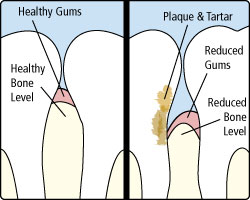
Periodontal FAQs
What is periodontics?
Periodontics is a dental specialty recognized by the American Dental Association, focusing on the study and treatment of the soft tissue and bone supporting the teeth and jaw.
Who is a periodontist?
A periodontist is a dental specialist who has the training and experience required by the American Dental Association to diagnose, treat, and prevent different forms of periodontal/gum disease.
What is periodontal disease?
The word "periodontal" literally means "around the tooth." Periodontal diseases are bacterial gum infections that destroy the gums and supporting bone that hold your teeth in your mouth. Periodontal diseases can affect one tooth or many teeth.
The main cause of periodontal diseases is  bacterial plaque, a sticky, colorless film that constantly forms on your teeth. If the plaque is not removed, it can turn into a hard substance called calculus or tartar in less than two days. Tartar is so hard that it can only be removed by the dentist or dental hygienist. The bacteria in plaque infect the gums, and release toxins that cause redness and inflammation. The inflammation and the toxins themselves cause destruction of the tissues that support the teeth, including the bone. When this happens, the gums separate microscopically from the teeth, forming pockets that fill with even more plaque causing even more infection.
bacterial plaque, a sticky, colorless film that constantly forms on your teeth. If the plaque is not removed, it can turn into a hard substance called calculus or tartar in less than two days. Tartar is so hard that it can only be removed by the dentist or dental hygienist. The bacteria in plaque infect the gums, and release toxins that cause redness and inflammation. The inflammation and the toxins themselves cause destruction of the tissues that support the teeth, including the bone. When this happens, the gums separate microscopically from the teeth, forming pockets that fill with even more plaque causing even more infection.
Besides the bacterial infection, there are multiple factors that can affect the health of your gums.
- Tobacco use significantly increases the risk of developing periodontal disease and can negatively affect treatment.
- Hormonal Changes during pregnancy, puberty and menopause can cause the gums to become red, tender and bleed easily.
- Genetics and family history of periodontal diseases indicate a greater likelihood of developing these diseases.
- Stress can make it more difficult for the body to fight off infection, including periodontal disease.
- Obesity can lead to an increase in pro-inflammatory chemicals in your body, and can increase the amount of inflammation and destruciton caused by periodontal disease.
- Some Medications such as oral contraceptives, antidepressants and certain heart medications, can affect oral health.
- Destructive Habits such as improper oral hygiene technique, oral piercings, drug or alcohol abuse can affect periodontal health.
- Poor Nutrition can make it harder for the body to fight off infection.
- Systemic Diseases that interfere with the body's immune system may worsen the condition of the gums and supporting bone.
What are the symptoms of periodontal disease?
Periodontal diseases are often silent, meaning that symptoms may not materialize until significant bone loss has occurred. Some people may not experience any symptoms and be unaware that they have the disease. The most common signs and symptoms of periodontal disease include:
- Red, swollen, or tender gums
- Gums that bleed when brushing and flossing
- Teeth that appear longer or become loose
- Large spaces that form between the teeth
- Gums that begin to pull away from the teeth
- Chronic bad breath
- Pus between the gum and tooth
- A change in the way you teeth fit together when you bite
- A change in the fit of partial dentures
Periodontal disease, if left untreated, can contribute to other health problems including heart disease and diabetes. Your dental health affects the overall health of your body.
How is periodontal disease treated?
During a periodontal examination, Dr. Crum will gently place a small measuring instrument called a periodontal probe in the pocket between the teeth and gums to measure the pocket depth and help make a diagnosis. Probing depths measuring 1-3 mm are usually considered healthy. 4-5 mm may indicate early periodontitis, 5-6 mm suggest moderate periodontitis, and 7 mm or greater may indicate severe periodontal disease. X-rays may be taken to evaluate the health of the bone supporting the teeth.
Once your periodontal health has been evaluated, Dr. Crum will work with you to determine the best treatment options to control your disease and bring you back to health. Treatment can vary depending on how far the disease has progressed. If diagnosed and treated in the early stages, simple non-surgical periodontal therapy may be sufficient. If periodontitis has advanced to the point where the periodontal pockets are deep and significant amounts of bone are lost, surgical therapy may be necessary.
Once periodontal disease has been controlled, patients will require ongoing periodontal maintenance procedures to sustain health. This ongoing phase of treatment will allow Dr. Crum to assess your periodontal health and make sure that your infection stays under control or remains eliminated. During these maintenance appointments, your mouth will be examined for changes in the pockets depths, new calculus and plaque will be removed and your teeth will be polished. Your bite may also be checked. Periodontal diseases are chronic diseases, just like diabetes. Without careful, ongoing treatment, periodontal diseases can and often do recur. These maintenance appointments are needed at a 3-4 month frequency. Often we alternate these appointments between our office and your general dentist,
Will my insurance cover my periodontal treatment?
Many insurance plans will provide assistance for periodontal treatment. Our practice understands how important your dental health is, and we want you to get the most out of any dental treatment you receive. We will help you work with your insurance provider to make sure that your treatment is easy on your budget, and your peace of mind.

